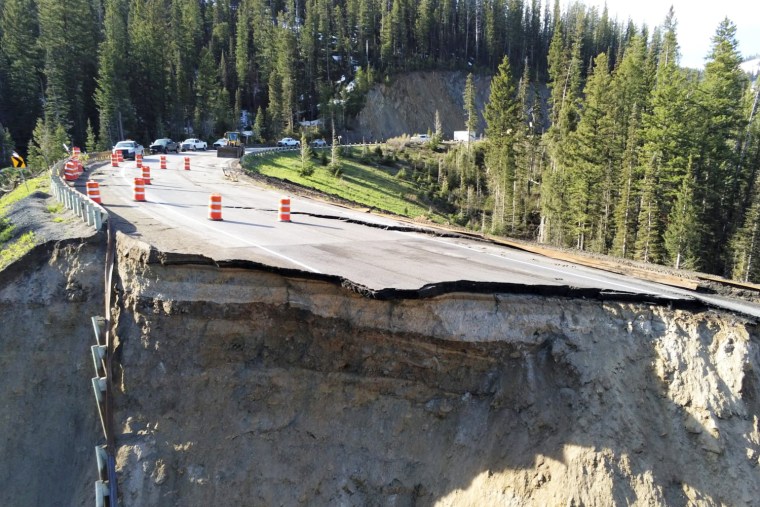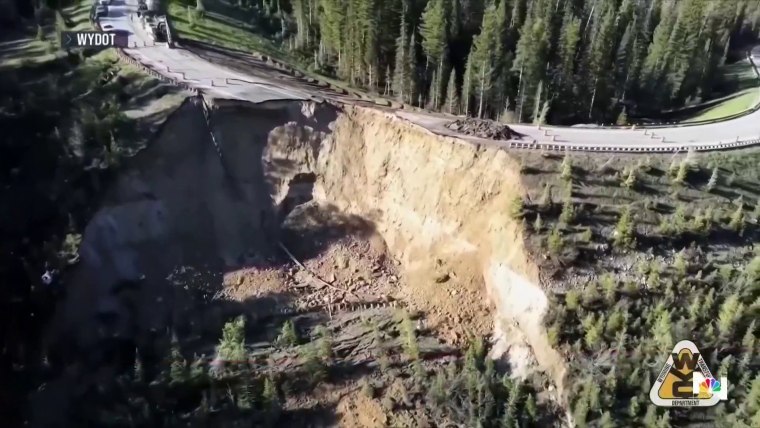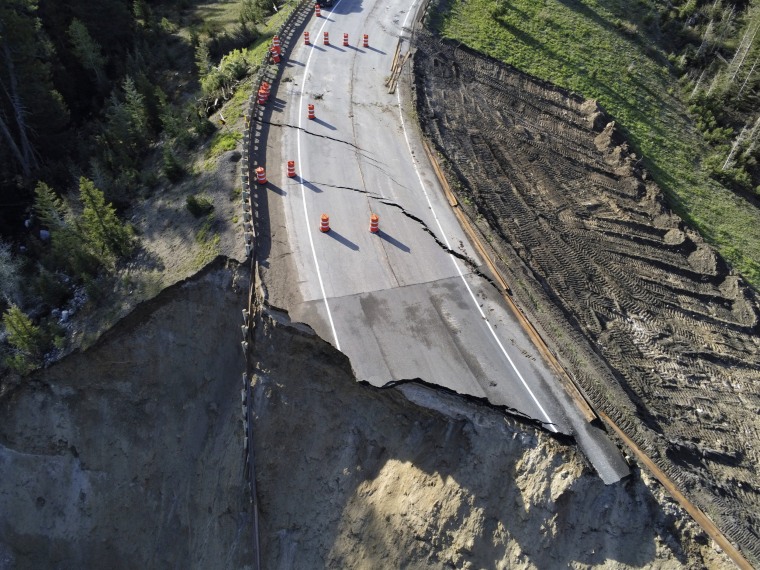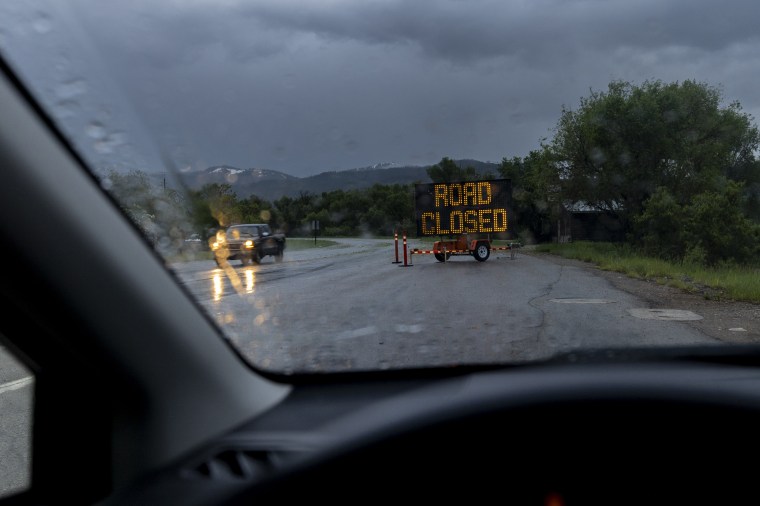begin quote from:
https://www.nbcnews.com/news/us-news/landslide-wyoming-deepens-disparities-ultra-wealthy-local-workers-rcna156574
A landslide in Wyoming deepens the disparities between the ultra-wealthy and local workers

The collapse of a vital road connecting workers in Idaho to jobs in Wyoming is bringing new attention to a longstanding schism between the ultra-wealthy and the people who cater to them.
Billionaires and investors have been pushing home prices in Jackson, Wyoming, into the stratosphere for years, forcing workers to live farther and farther from their jobs.
Already burdened by long commutes, people who work at hospitals, outfitters and landscaping companies now face an indefinite road closure that is upending their lives yet is unlikely to affect their wealthy clients.
What started as a crack in the Teton Pass last week turned into a massive landslide that closed a 10-mile stretch of road, which serves as a main gateway between Idaho and Jackson, Wyoming.
Transportation officials said the “catastrophic failure” would take months to repair. Meantime, a two-lane detour should be completed within weeks, according to the Wyoming Department of Transportation.

The rush comes as tourist season gets underway in the Rocky Mountains, where some 15,000 people are expected to descend on nearby Grand Teton and Yellowstone national parks each day.
Closing the Teton Pass for even a few weeks means cutting off a vital artery for people who live in Idaho but work in Jackson, a mountain and ski haven that has become a playground for Hollywood celebrities, tech tycoons and billionaires looking to get away from city life.
“The landslide really shines a ton of light on how unsustainable our community is,” said Jacob Gore, a Wyoming native who lives in Idaho because of rising costs. “I just accepted that I will never own a home in Jackson unless I win the lottery.”

At St. John's Health in Jackson, about 20% of health care workers commute from the Teton Valley on the other side of the pass. This includes 115 essential workers who need to be on site every day, according to hospital spokesperson Karen Connelly.
Many of those workers face 12-hour shifts and cannot accommodate an additional four to six hours a day of driving time, Connelly told Teton County commissioners this week during a hearing.
On average, more than 2,500 people commute daily from Idaho to Jackson, which is in the wealthiest county in the United States, per capita, the county housing authority said. It has a median income of more than $108,000, compared to Teton County, Idaho, where the median income is $89,000, according to U.S. Census data.
Home prices between the neighboring counties vary exponentially. On the Wyoming side, the median home price is more than $3 million compared to about $800,000 in Idaho.
The allure of snow-capped mountain peaks and crystal clear lakes has long attracted both homesteaders and business leaders. Moguls like Ted Turner, Jeff Bezos and Warren Buffett each own hundreds of thousands of acres of land in the West, and the federal government controls about 50% of land from Kansas to the Pacific Ocean.
Competition to build, own and rent is fierce in the most desirable areas, including gateway communities to national parks. Demand only increased during the pandemic, as remote workers sought to relocate.
"We're working our butts off so the billionaires can have nice gardens to look at in their vacation homes that they spend a few weeks in a year," said Rory Nelson, who lives in Victor, Idaho, and owns a small gardening company in Jackson.
"It’s heartbreaking because this is my home," he said, adding that he is now driving up to six hours a day because of the road closure.
Many people who live in communities like Victor and Driggs in the Teton Valley say they are now forced to choose between spending a full day in the car or finding temporary housing closer to work.
Idaho resident Gore runs a wildlife tour company and said he woke up to several missed calls from frantic clients and employees when news spread about the landslide. One tour guide, who lives in Driggs, opted to sleep in his car the night before an early morning outing rather than wake up at 3 a.m. to pick up his clients in Jackson at 6 a.m.
“If just one of these billionaires wanted to step in and help out, our community would change for the better,” he said. “But our workers aren’t thought of until their favorite restaurant closes."
Since the road closure, John Thomas Smaellie, a construction superintendent from Driggs, has been snaking his way south on Highway 33 into a neighboring valley and around a lake before turning north toward Jackson.
While he describes the two- to three-hour commute as “absolutely gorgeous,” Smaellie is missing crucial time away from his family. His 7-year-old daughter is the youngest rodeo princess in their town and requires hours of rehearsal and preparation before competitions, he said.
On Wednesday night, rather than help her get ready for an upcoming pageant, Smaellie was stuck on the road.

“Is my job really worth missing these things?” he asked. “I know they’re going to have a temporary road, but is it going to last? Emotionally, it’s very taxing to be at work knowing that if I left right now I could be home in time.”
Smaellie, a fifth-generation Driggs resident, has watched prices in his hometown skyrocket as “billionaires drive out the millionaires” from Jackson, a popular refrain among locals.
When he was young, Smaellie's parents bought a home and other investment properties on their public school salaries, he said. Smaellie, however, is forced to rent even as gated communities are built around him.
For his workers, who earn $60,000 to $70,000 a year, even renting is unaffordable. Six members of his crew share a two-bedroom apartment, he said.
Still, the idea of relocating his family outside the region is unfathomable.
“I would like my kids to see their father’s grave when I pass away,” he said. “I can go see my great-great-great grandfather’s grave in Tetonia. That is where my bitterness comes from.”
Like other regions that cater to luxury resorts, housing affordability in Jackson has been a problem for decades.
In 2020, the county set the goal of housing 65% of workers within its limits. Currently the county is at roughly 60%, according to housing director April Norton.
“There is a recognition that without permanently protecting homes for local workers, we might run out of them,” she said.
Chase Putnam, who owns a fishing outfitter in Jackson, is opening his eight-person camper to anyone in need of temporary accommodations. He bristled when asked about the affordability crisis and accused county commissioners of not acting quickly enough to secure housing for workers.
“I can barely rub two dimes together and I’m the one stepping in?” he said.
When asked for comment, the Board of County Commissioners referred questions to the housing authority.
"If there is political will, then certainly there are things to look at it," Norton said of building more workforce housing. "But it comes down to politicians, so we'll see what happens."
On Wednesday, the commissioners approved an ordinance that will temporarily allow camping units and mobile homes in all zones until the road reopens. But because 97% of surrounding land is owned by the federal government, it will largely be up to private landowners to welcome people in need.
While any permanent housing solution is years away, local residents are stepping in to offer immediate help. Melissa Thomasma, who lives in Victor, Idaho, created a mutual aid Facebook group after the landslide.
The nearly 2,000-member account is filled with posts from people offering campers, carpools and even audiobook credits for the long commute.
"That’s such a core value of our community,” she said. “You lend a hand when you can.”



No comments:
Post a Comment